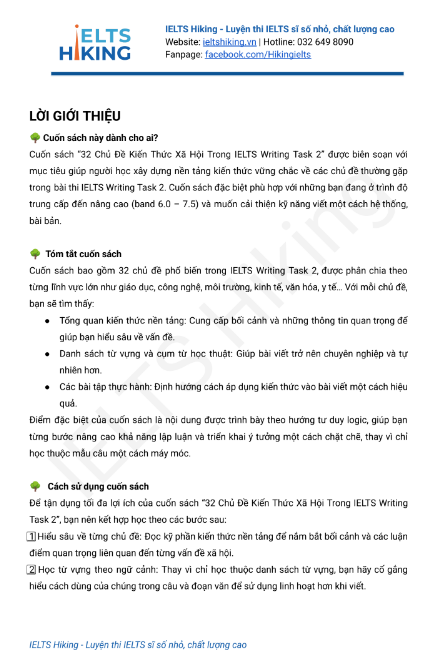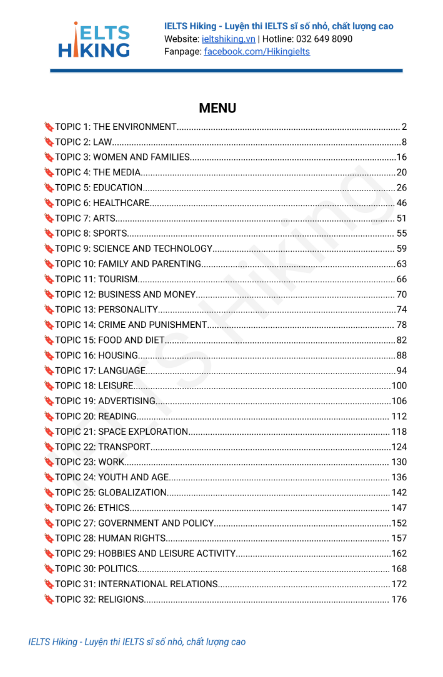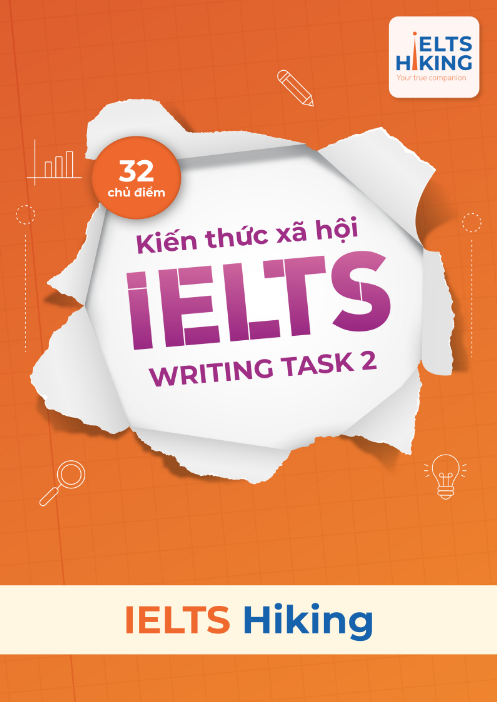


Mục lục
ToggleMENU
| Topic | Page |
|---|---|
| TOPIC 1: THE ENVIRONMENT | 2 |
| TOPIC 2: LAW | 8 |
| TOPIC 3: WOMEN AND FAMILIES | 16 |
| TOPIC 4: THE MEDIA | 20 |
| TOPIC 5: EDUCATION | 26 |
| TOPIC 6: HEALTHCARE | 46 |
| TOPIC 7: ARTS | 51 |
| TOPIC 8: SPORTS | 55 |
| TOPIC 9: SCIENCE AND TECHNOLOGY | 59 |
| TOPIC 10: FAMILY AND PARENTING | 63 |
| TOPIC 11: TOURISM | 66 |
| TOPIC 12: BUSINESS AND MONEY | 70 |
| TOPIC 13: PERSONALITY | 74 |
| TOPIC 14: CRIME AND PUNISHMENT | 78 |
| TOPIC 15: FOOD AND DIET | 82 |
| TOPIC 16: HOUSING | 88 |
| TOPIC 17: LANGUAGE | 94 |
| TOPIC 18: LEISURE | 100 |
| TOPIC 19: ADVERTISING | 106 |
| TOPIC 20: READING | 112 |
| TOPIC 21: SPACE EXPLORATION | 118 |
| TOPIC 22: TRANSPORT | 124 |
| TOPIC 23: WORK | 130 |
| TOPIC 24: YOUTH AND AGE | 136 |
| TOPIC 25: GLOBALIZATION | 142 |
| TOPIC 26: ETHICS | 147 |
| TOPIC 27: GOVERNMENT AND POLICY | 152 |
| TOPIC 28: HUMAN RIGHTS | 157 |
| TOPIC 29: HOBBIES AND LEISURE ACTIVITY | 162 |
| TOPIC 30: POLITICS | 168 |
| TOPIC 31: INTERNATIONAL RELATIONS | 172 |
| TOPIC 32: RELIGIONS | 176 |
LỜI GIỚI THIỆU
Cuốn sách này dành cho ai?
Cuốn sách “32 Chủ Đề Kiến Thức Xã Hội Trong IELTS Writing Task 2” được biên soạn với mục tiêu giúp người học xây dựng nền tảng kiến thức vững chắc về các chủ đề thường gặp trong bài thi IELTS Writing Task 2.
Cuốn sách đặc biệt phù hợp với những bạn đang ở trình độ trung cấp đến nâng cao (band 6.0 – 7.5) và mong muốn cải thiện kỹ năng viết một cách hệ thống và bài bản.
Tóm tắt cuốn sách
Cuốn sách bao gồm 32 chủ đề phổ biến trong IELTS Writing Task 2, được phân chia theo từng lĩnh vực lớn như giáo dục, công nghệ, môi trường, kinh tế, văn hóa, y tế…
Với mỗi chủ đề, bạn sẽ tìm thấy:
- Tổng quan kiến thức nền tảng: Cung cấp bối cảnh và thông tin quan trọng giúp bạn hiểu sâu về vấn đề.
- Danh sách từ vựng và cụm từ học thuật: Giúp bài viết trở nên tự nhiên, chuyên nghiệp hơn.
- Các bài tập thực hành: Giúp bạn áp dụng kiến thức vào bài viết hiệu quả.
Điểm đặc biệt của cuốn sách là nội dung được trình bày logic, mạch lạc, giúp bạn từng bước nâng cao khả năng lập luận và triển khai ý tưởng thay vì học thuộc mẫu câu máy móc.
Cách sử dụng cuốn sách
Để đạt hiệu quả cao nhất, bạn nên học theo các bước sau:
- Hiểu sâu về từng chủ đề: Đọc kỹ phần nền tảng để nắm bối cảnh và luận điểm quan trọng.
- Học từ vựng theo ngữ cảnh: Không chỉ học thuộc, mà cần hiểu cách dùng trong câu để sử dụng linh hoạt.
- Phân tích bài mẫu và rút kinh nghiệm: Quan sát cách triển khai, lập luận và sử dụng từ vựng trong bài mẫu.
- Luyện tập viết theo chủ đề: Áp dụng kiến thức và từ vựng đã học vào bài viết của chính bạn.
Cô Lan Phương tin rằng với cấu trúc khoa học và nội dung thực tế, cuốn sách này sẽ trở thành trợ thủ đắc lực giúp bạn tự tin hơn trong phần thi IELTS Writing Task 2.
Có thể bạn cũng muốn đọc thêm các cuốn sách tiếng Anh sau:
Nếu bạn có thắc mắc, hãy liên hệ qua:
Group: 8.0 IELTS không cần xin vía
Chúc bạn học tốt và đạt được mục tiêu mong muốn!
TOPIC 1: THE ENVIRONMENT
I. General Topic Information
Activity 1: Read the following passage and answer these questions with a short answer.
- Topics focusing on the environment usually cover a number of key areas including preservation of animal and plant species, preservation of habitat or natural areas, and pollution in its various forms.
- Animals have rights — a concept many students rarely consider. Animal testing is used for scientific research, drug testing, and consumer products. It would be unacceptable to test on humans without consent, so it can be argued that it should also be unacceptable on animals. It may be justified for medical research leading to cures for serious diseases, but not for cosmetics.
- Animals are a source of food, drugs, and materials (e.g., leather, sheep skin). They are also pets — often denied the chance to reproduce and socialize but usually well-treated. Animals play vital roles in education, biodiversity, and maintaining a healthy planet.
- Environmental issues can be addressed locally or globally. Local actions can have the most immediate impact, since soil, air, and water pollution are strongest near their sources. Many local improvements contribute to global progress. However, poorer countries often sacrifice the environment for growth, while wealthy nations impose strict laws, leading to pollution transfer. Global initiatives encourage countries to manage local environments effectively.
- Excessive consumerism contributes to environmental problems. Short-lived products, excessive packaging, and unnecessary consumption worsen pollution. Prices often fail to reflect environmental costs, so many countries now apply carbon pricing to hold companies accountable.
- Nuclear power produces large energy amounts without atmospheric pollution under normal conditions. However, failures such as Fukushima and Chernobyl have catastrophic consequences. Despite these being rare, nuclear waste poses long-term risks due to its radioactive nature.
- Water is essential for life and must be carefully managed. Population growth and pollution intensify water scarcity. Water carries pollutants over long distances, making purification difficult. Problems include hormone contamination and toxic chemicals.
- Noise pollution mainly affects emotional well-being, preventing relaxation and concentration. Although the brain can filter noise, constant background sounds may lead to stress and fatigue.
Questions
- What key areas do environmental topics cover?
- Is animal testing always justifiable?
- Why are animals important?
- What are some reasons for addressing environmental problems locally?
- Why is the environment in less developed countries often more polluted?
- What are the benefits of addressing environmental issues globally?
- What are some characteristics of excessive consumerism?
- What are the advantages and disadvantages of nuclear power?
- Why is it difficult to make water sources clean?
- What are the consequences of noise pollution?
II. Topic Vocabulary
Activity 2: Read the passage again and find English words/phrases equivalent to the Vietnamese ones.
| Vietnamese | English Equivalent |
|---|---|
| Sự bảo tồn | Preservation |
| Loài | Species |
| Môi trường sống | Habitat |
| Quyền | Rights |
| Bị tước đi cơ hội làm gì | Be denied the opportunity to do something |
| Sự đa dạng | Diversity |
| Sinh sản | Reproduce |
| Được đối xử tốt | Be well treated |
| Nghiên cứu trong lĩnh vực y tế | Medical research |
| Biện pháp chữa trị bệnh | Cure for diseases |
| Bệnh nặng | Serious diseases |
| Mỹ phẩm | Cosmetics |
| Hàng tiêu dùng | Consumer products |
| Thực hiện việc thử nghiệm trên động vật | Perform animal testing |
| Không có sự đồng ý | Without consent |
| Bênh vực cho cái gì | Argue for / Advocate for |
| Nghiên cứu khoa học | Scientific research |
| Việc thử nghiệm các loại thuốc | Testing of drugs |
| Duy trì sự đa dạng sinh học | Maintain biodiversity |
| Hành tinh khỏe mạnh | A healthy planet |
| Ở cấp độ địa phương | At a local level |
| Ở cấp độ toàn cầu | At a global level |
Các sách tiếng anh khác cùng chủ đề:
- Tải FREE sách 30 Ngày Thành Thạo IELTS Writing PDF có tiếng Việt
- Sách Speaking Forecast Quý 1 – 2025 PDF tải FREE có tiếng Việt
- Tải FREE sách Kỹ Thuật Paraphrase IELTS Writing Task 2 PDF có tiếng Việt
- Tải FREE sách Tiếng Anh Đơn Giản Cho Người Bận Rộn PDF có tiếng Việt
- Tải FREE sách IELTS INSIGHTS PDF có tiếng Việt



